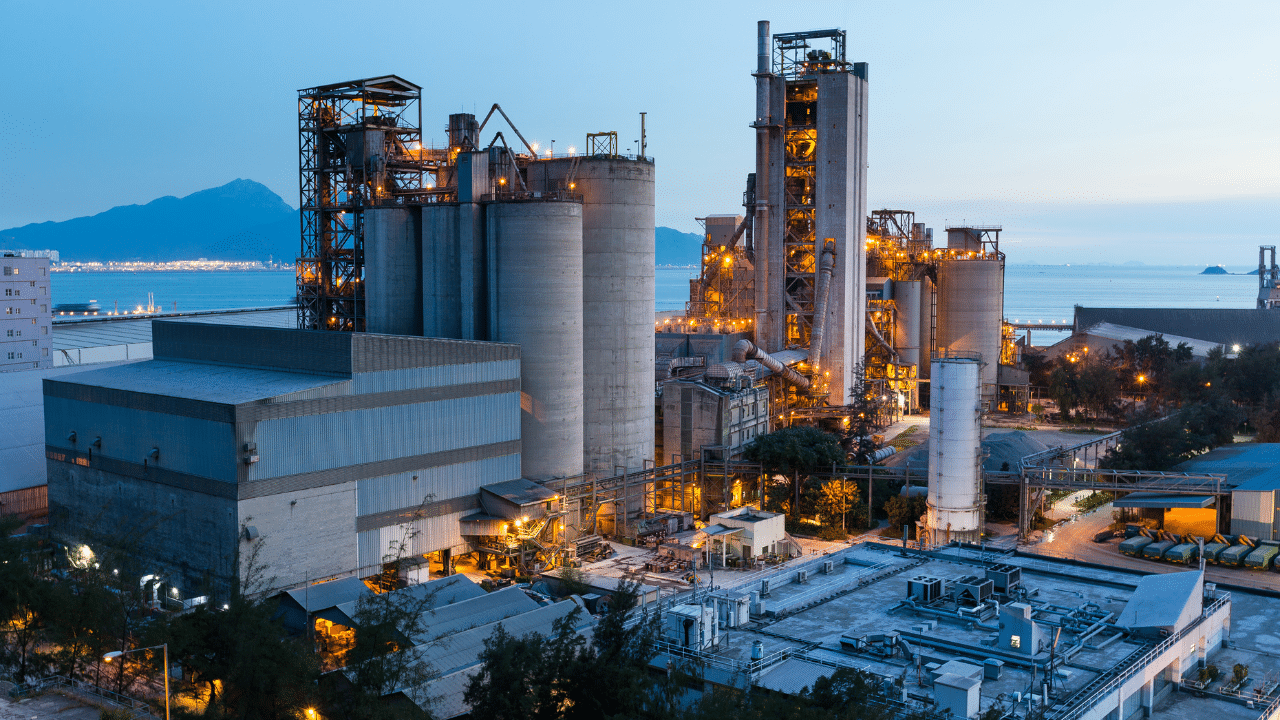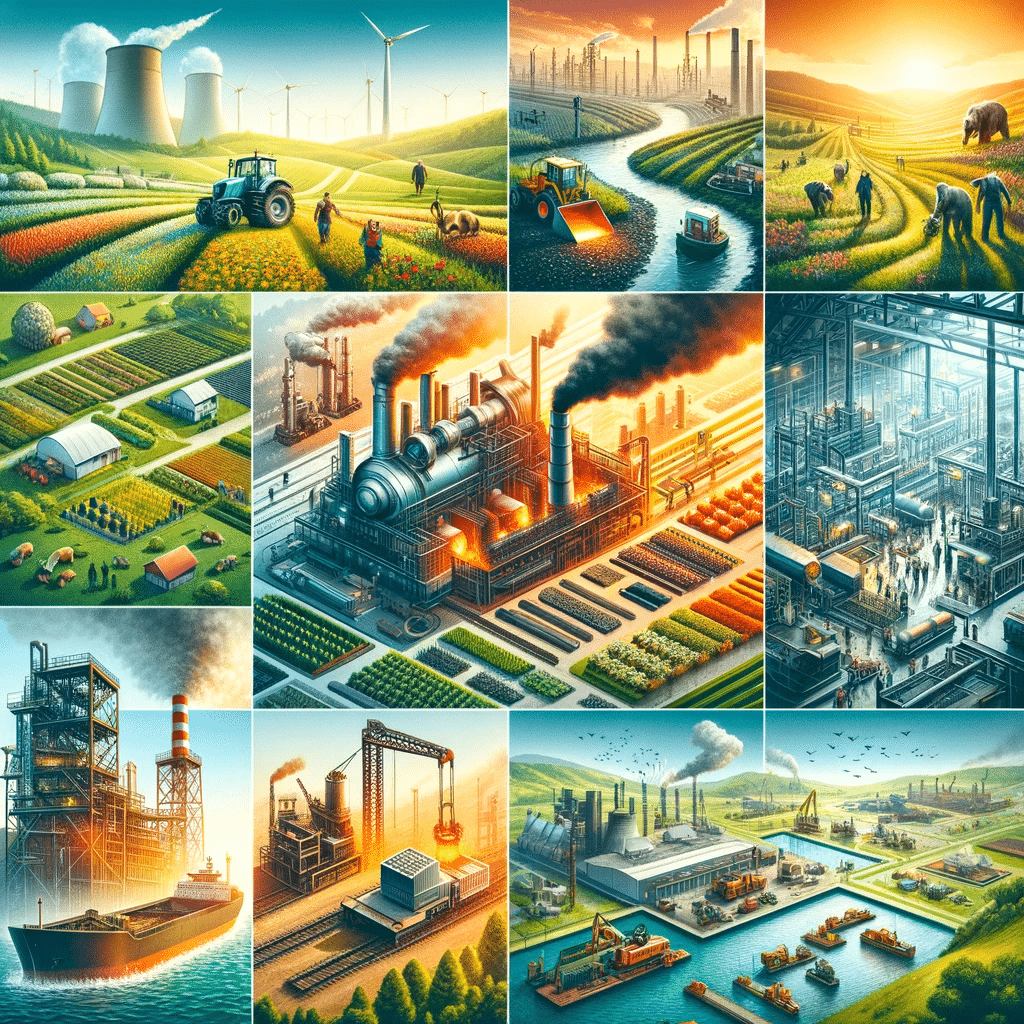
Key Takeaways
- Basic industries contribute significantly to the global economy and influence trade balances, commodity prices, and economic health.
- Major sectors within the basic industries include mining, agriculture, oil, and steel, among others.
- These industries play a crucial role in shaping the economic landscape, providing stable employment opportunities, and supporting daily life.
- As of September 2023, the United States labor statistics reported a total of 169,148,100 employment positions within basic industries.
- Basic industries can be expected to continue evolving with advancements in technology, market trends, and sustainable practices, impacting the availability of various job opportunities and roles.
Understanding Basic Industries and Their Economic Foundation
Basic industries, by definition, are the sectors responsible for extracting and producing raw materials that are directly used by consumers as consumer goods or within other industries. To fully grasp the importance of basic industries, it is essential to examine the vital roles they play in the global economy, their impact on trade balances, and their contribution to economic health.
What Constitutes Basic Industries
Encompassing sectors such as oil, steel, mining, and agriculture, basic industries are the primary drivers behind the production and distribution of essential raw materials. These sectors power industries by providing energy sources, supply construction materials, and ensure the availability of food, ultimately showcasing the interconnectedness of basic industries with both global economics and everyday life.
- Oil: Crucial for transportation, electricity generation, and production of plastics and chemicals.
- Steel: A primary construction material for buildings, infrastructure, and consumer goods.
- Mining: Extracts precious metals, minerals, and vital energy sources like coal.
- Agriculture: Produces food, beverages, and raw materials used in various industries such as textiles and biofuels.
The Integral Role of Basic Industries in Global Economics
As significant contributors to economic growth, basic industries have a far-reaching impact on various aspects of the global economic landscape. They create jobs, influence trade, determine commodity prices, and drive a nation’s economic prosperity. Delving into how basic industries affect global economics reveals their essential nature:
- Contribution to GDP: The combined output of basic industries has a substantial effect on gross domestic product, reflecting the sector’s overall importance in the economy.
- Infrastructure development: The availability of raw materials from these industries drives the construction of infrastructure projects, fostering further economic growth.
- Innovation and R&D: As industries develop and adapt to changing markets, basic industries play a vital role in encouraging technological advancements and research.
- Commodity trading: Basic industries have a significant influence on international trade, determining the prices of various commodities on global markets.
In summary, basic industries serve as the foundation of the global economic system, providing essential raw materials for the production of a wide range of consumer goods and other industrial sectors. Their impact on GDP, employment opportunities, infrastructure development, and trade highlights their critical role in shaping the economic health of nations worldwide.
The Cornerstones of Basic Industries: Oil and Steel’s Industrial Influence

The oil industry and steel industry play a fundamental role in driving industrial development and have a significant impact on key economic indicators. As the primary sources of energy and essential construction materials, respectively, their performance offers vital insights into the infrastructural growth and overall health of the economy.
Global demand for oil is influenced by various factors like geopolitical strategies, energy policies, and technological advancements. Consequently, the oil industry has a far-reaching effect on other industrial sectors. For instance:
- Fuels transportation and logistics
- Acts as a raw material for the manufacturing of plastics and chemical products
- Drives electricity generation
On the other hand, the steel industry serves as the backbone of various infrastructures, including:
- Transportation networks like bridges, railways, and highways
- Commercial and residential buildings
- Industrial facilities and power plants
- Aerospace and automotive components
As such, tracking the performance of these two crucial industries allows for a better understanding of global economic trends. In conclusion, the significant influence exerted by the oil and steel industries, both on the industrial development and as key players in basic industries, underscores their critical role in shaping the global economic landscape.
The Backbone of Civilization: Agriculture’s Enduring Presence
Agriculture, the oldest basic industry, has provided both food and raw materials for sectors such as textiles for centuries. Its ongoing evolution with technological advancements and sustainable practices has been the cornerstone of human civilizations and a major driving force behind economic activities worldwide.
Throughout history, the agriculture sector has exhibited a remarkable ability to adapt to societal and technological changes. From the agricultural revolution to modern-day farming practices, this vital industry has consistently expanded food production capabilities in order to meet the demands of a growing global population.
- Advances in irrigation systems have enabled the cultivation of previously unproductive or arid lands.
- Improved crop varieties and livestock breeds increase productivity and yield.
- Mechanization of farming processes, such as the use of tractors and harvester equipment, has resulted in efficiency gains and higher crop yields.
- Integrated pest management and precision agriculture techniques allow for the targeted and eco-friendly use of fertilizers and pesticides, minimizing environmental impacts.
Apart from contributing to food production, agriculture also supplies raw materials essential to the textile industry. Natural fibers such as cotton, wool, and silk are widely used in the production of clothing, upholstery, and other textile products. The importance of agriculture in providing these raw materials cannot be overstated, as it directly impacts the livelihoods of millions of people working in the textile industry.
In response to the increasing need for sustainable agricultural practices, new technologies like vertical farming, drone technology, and bioengineering have emerged – demonstrating the potential for addressing food security concerns while minimizing ecological footprints. These innovations in agriculture will be essential for meeting the needs of future generations while maintaining a sustainable balance between production and environmental preservation.
In conclusion, agriculture’s long standing role as a key basic industry is evident in its continuous adaptation and innovation, as well as its enduring presence in providing food and raw materials for textiles. As the world’s population continues to grow, it is of paramount importance that the agriculture sector maintains its steadfast commitment to sustainable practices and ingenuity, ensuring the health and well-being of humanity and the world that sustains us.
Unearthing Wealth: Mining and Its Contribution to National Economies
The mining industry plays a significant role in the economic development of nations. It encompasses the extraction of precious metals, such as gold and silver, and other valuable minerals like coal, which is a critical energy source. Despite facing sustainability challenges, the mining industry offers numerous job opportunities and remains a resilient sector for countries’ economies.
Extracting Precious Commodities
Mining is a crucial part of the basic industries, as it supplies raw materials to various sectors. The extraction of precious metals, rare earth minerals, and base metals collectively contribute substantially to global trade and wealth creation for many countries. These valuable resources are used in industries such as electronics, automotive, aerospace, and construction, further highlighting the importance of the mining industry in the worldwide economic landscape.
Mining’s Technological Transformation and Job Market
Technological advancements have driven significant changes in the mining industry. Innovations such as real-time monitoring with the Internet of Things (IoT), automation, and advanced data analytics have redefined the extraction and production processes. These technologies not only minimize the environmental impact of mining but also improve efficiency and productivity, making the sector more sustainable in the long run.
With the increasing adoption of technology in mining, high-paying job roles in fields such as robotics, data analysis, and engineering have emerged. The industry’s adaptability in the job market is evident, as more positions with specialized skill sets are becoming available. For instance:
- Mine Engineers: Plan, design, and oversee mining projects.
- Geologists: Analyze geological data to identify and assess ore deposits.
- Environmental Engineers: Develop strategies to minimize environmental impact and ensure compliance with regulations.
- Data Analysts: Use data to optimize mining operations and predict future trends.
In conclusion, the mining industry remains a vital contributor to national economies, offering lucrative job opportunities and extracting valuable resources that fuel various sectors. As technology continues to revolutionize the industry, mining is set to become more sustainable and resilient, driving its significance in the global economic landscape further.
From Farm to Fabric: Agriculture’s Extensive Reach in Basic Industries
Agriculture has a far-reaching impact not only in producing food to sustain the world’s growing population but also in supplying essential raw materials for other industries, such as textiles. The agriculture sector plays a pivotal role in basic industries, showcasing its extensive influence on the global economy.
Primarily known for its contribution to sustainable food production, agriculture also provides crucial raw materials such as cotton, wool, and flax – the key components in the textile industry. This interconnectedness between agriculture and textiles emphasizes the significant role the agriculture sector holds within basic industries. As the global population continues to grow, so does the demand for food and textile products.
- Feeding the world: The agriculture sector is responsible for producing various crops and livestock to feed billions of people worldwide. It plays a vital role in ensuring global food security, addressing hunger and malnutrition challenges.
- Supporting the textile industry: Several agricultural products, such as natural fibers like cotton, wool, and flax, serve as raw materials for producing textiles. The textile industry heavily relies on these ingredients to manufacture clothing, upholstery, carpets, and other fabric products.
- Adopting sustainable practices: With the increasing demand for food and textiles, the agriculture sector faces the challenge of achieving higher productivity while minimizing its environmental footprint. The implementation of innovative and eco-friendly farming techniques is crucial for meeting these demands and ensuring the long-term sustainability of the sector.
As the agriculture sector continues to adopt new technologies and implement sustainable practices, it will significantly impact basic industries in the future. From feeding billions to clothing them, agriculture remains a central player in various industries, solidifying its extensive and enduring influence on the world economy.
Other Basic Industries: Pillars of Daily Life and Modern Infrastructure
While sectors like agriculture, mining, and oil take center stage when discussing basic industries, other primary sector businesses, such as the paper and chemical industries, perform equally important roles that often go unnoticed. These industries not only act as crucial pillars of our daily lives, but also significantly contribute to supporting modern infrastructure.
The paper industry is responsible for a vast array of products we rely on daily, from office paper and newspapers to packaging materials. As this industry evolves in response to growing ecological concerns, sustainable and eco-friendly paper materials are becoming increasingly popular.
- Office paper: Essential for businesses in all sectors, office paper plays a vital role in maintaining daily operations and documentation.
- Packaging materials: Crucial for the shipment and protection of goods, packing materials such as cardboard boxes and paper-based containers are widely utilized in various industries.
- Sustainable paper goods: Eco-friendly paper alternatives, such as recycled paper and materials sourced from responsibly managed forests, have gained prominence as consumers and businesses prioritize reducing their environmental impact.
In addition to the paper industry, the chemical industry also operates as a primary sector business that is instrumental in modern infrastructure and daily life. The industry is incredibly diverse, producing a wide array of products, including plastics, pharmaceuticals, and agricultural chemicals.
- Plastics: Versatile and durable, plastic materials are integral to the manufacturing of countless products within industries such as automotive, electronics, and packaging.
- Pharmaceuticals: The chemical industry greatly contributes to the discovery and production of life-saving pharmaceutical drugs and essential medical treatments.
- Agricultural chemicals: From fertilizers and pesticides to animal health products, this sector offers critical support to farmers, ensuring optimal crop production and food security.
As the global economy continues to evolve, these primary sector businesses will maintain their significance and contribute to our society’s development. The paper and chemical industries are essential in providing the materials and technologies that support our consistent economic growth and ensure a better quality of life for millions.
Employment Outlook: Analyzing Job Opportunities in Basic Industries

Basic industries play a fundamental role in the global economy, offering a diverse range of job opportunities in key sectors such as agriculture, forestry, mining, and construction. This article will examine the various employment prospects for individuals seeking work in these vital industries, along with anticipated growth trends for the next eight years.
The Number of Jobs Available Across Sectors
As essential drivers of economic development, basic industries provide numerous opportunities for employment. According to recent data, over 23 million individuals are employed across these areas, revealing a vast pool of job availability within diverse sectors. From agriculture and forestry to mining and manufacturing, to construction and utilities, these industries illustrate a significant presence in national workforce figures:
- Agriculture and forestry: 2.2 million workers
- Mining and logging: 600,000 workers
- Construction: 7.6 million workers
- Manufacturing: 12.3 million workers
- Utilities: 550,000 workers
Growth Trajectories in Basic Employment Markets
With an anticipated growth of 2.7% over the next eight years, basic industries are projected to continue their trajectory of resilience and adaptability in the face of ever-evolving market trends. While many factors will contribute to these growth patterns, several key drivers are worth noting:
- Technological advancements: As industries innovate and adopt new technologies, such as artificial intelligence, robotics, and IoT devices, new opportunities for skilled workers will emerge. These cutting-edge roles are expected to shape the employment landscape across basic industries, with a high demand for professionals who can adapt to rapidly evolving job requirements.
- Sustainable practices: In response to growing concerns surrounding environmental sustainability, many basic industries are taking measures to incorporate greener initiatives, such as energy-efficient technologies, carbon offsetting, and waste reduction strategies. As these industries transition towards more eco-conscious practices, additional job roles within research, development, and implementation of sustainable measures are likely to arise.
In conclusion, employment in basic industries offers a diverse array of opportunities for individuals looking to enter the workforce or advance their careers within sectors such as agriculture, mining, and construction. With a solid growth outlook and continuous focus on technological innovations and sustainability, these industries are poised to shape the employment landscape for years to come.
The Spectrum of Opportunities: Diverse Roles in Basic Industries
Job roles within basic industries are vast and diverse, offering a spectrum of opportunities that are foundational, supporting various skill sets. These industries provide a wide range of positions for individuals with different interests, experiences, and qualifications, thus enabling them to contribute to the production chain. Let us explore some of the primary job roles in these critical sectors.
In the mining industry, a significant field within basic industries, there are various roles, such as:
- Geologists
- Miners
- Mine Engineers
- Environmental Consultants
- Health and Safety Specialists
Similarly, the oil and gas sector offers diverse employment opportunities covering a wide range of roles, such as:
- Petroleum Engineers
- Geologists and Geophysicists
- Drilling Engineers
- Pipeline Engineers
- Environmental Scientists
In the agricultural industry, there is a multitude of job roles, ranging from farm and facility management to research and development:
- Farm Managers
- Soil Scientists
- Agricultural Engineers
- Agronomists
- Animal Nutritionists
In the steel industry, some of the key job roles include:
- Metallurgical Engineers
- Steel Mill Technicians
- Process Control Engineers
- Quality Assurance Inspectors
- Production Planners
Beyond production and extraction roles, basic industries also offer diverse employment opportunities in logistics, distribution, and sales. As industries continuously adapt to technological advances and changing market conditions, the range of job roles is likely to expand even further, offering exciting possibilities for individuals looking to embark on a career in these vital sectors.
Future Predictions: Job Market Trends in Basic Industries
As the global economy continues to change and evolve, so does the landscape of basic industries. Future job market trends point to a definite shift towards renewable resources and the integration of advanced technologies, with traditional sectors such as agriculture, mining, and oil undergoing significant transformation.
Industry transformation is expected to affect job availability, with specialized skills in robotics, artificial intelligence (AI), and sustainable practices becoming highly sought after.
- Renewable Energy Growth: As concerns over climate change rise, there will be an increasing demand for more sustainable energy solutions. Renewable energy sources such as solar, wind, and hydroelectric power will play a vital role in the basic industries, creating more job opportunities in these sectors.
- Technology Integration: With the implementation of cutting-edge technologies like AI, Big Data, and IoT in basic industries, the job market will expand in areas related to technology development, integration, and maintenance. Job roles such as system analysts, data scientists, and automation engineers will be in high demand.
- Greater Focus on Sustainability: The push for sustainable practices in basic industries will result in the development of innovative solutions to minimize the environmental impact. Job roles focused on environmental management, sustainable resource extraction, and circular economy practices will become increasingly relevant.
- Higher Demand for Skilled Workers: As basic industries undergo significant transformation, the need for skilled workers with specialized knowledge and expertise will rise. Employers will look for employees capable of managing complex systems, analyzing data, and finding innovative ways to improve efficiency and sustainability.
In conclusion, basic industries will experience substantial changes in the coming years, driven by the emergence of renewable energy, growing technology adoption, and the focus on sustainability. As industries transform, the job market will see increased demand for specialized skills, resulting in a shift in the employment landscape. Preparing for these trends now will ensure that workers are well-equipped to meet future industry demands and remain competitive in the evolving job market.
Fueling the Economy: The Significant Role of Oil in Basic Industries
The oil industry holds a prominent position in basic industries due to its importance as a primary energy source. Its significance is felt on a global scale, as it has a major impact on the world’s economies, shaping strategies and policies based on the dynamics of supply and demand. With an upward trajectory in production, the oil industry remains a powerhouse, helping to fuel economies across the globe.
As a testament to the oil industry’s significance, its production and consumption patterns often serve as key indicators for global economic trends. Not only does it contribute to power generation, transportation, and various industrial processes, but also supports numerous products and services that contribute to the overall development of economies.
From an employment perspective, the oil industry provides a multitude of career opportunities ranging from technical roles to management and sales positions, fostering inclusive growth and economic development. Additionally, the industry’s focus on innovation and sustainability creates new avenues for job seekers and promotes skill enhancement in cutting-edge areas such as renewable energy and digitalization.
Looking at the global output of the oil industry, it is expected to reach record levels in the coming years, driven by rising demand from emerging economies and advancements in extraction technologies. Despite the increasing shift towards renewable energy sources, oil remains a crucial component in meeting the world’s energy demands and sustaining economic growth.
- Primary energy source: Oil is the lifeblood of numerous industries, serving as a key component for power generation and transportation.
- Global influence: The dynamics of oil supply and demand shape world economies and influence geopolitical strategies.
- Employment opportunities: A thriving sector offering a wide range of career options and skill development pathways.
- Record outputs: Expected to achieve all-time high production levels in the coming years, further solidifying the industry’s position in basic industries.
In conclusion, the oil industry, as a leading energy source, continues to play an integral role within the framework of basic industries. Its global influence, employment generation, and accelerating production only emphasize its importance in economies worldwide. Despite the ongoing transition towards cleaner energy sources, the oil industry remains a powerhouse fueling the global economy.
Feeding the World: Agriculture’s Unwavering Significance in Basic Industries
Agriculture’s role in the modern world is undeniably crucial, with its primary responsibility being to ensure food security and provide raw materials for various industries. As population growth continues to put pressure on food production, the need for sustainable and efficient agriculture systems has never been more apparent. Technological innovation in farming plays a significant part in addressing these challenges and cementing agriculture’s indispensable presence in basic industries.
Food security, a critical aspect of global well-being, depends on the stable and efficient production of a sufficient, safe, and nutritious food supply. As the backbone of food production, agriculture plays a vital role in fulfilling this necessity. It not only provides sustenance for the growing global population but also serves as a significant source of income and employment for millions of people.
Another aspect of agriculture’s importance lies in its contribution to industrial raw materials. The sector supplies essential resources to various industries such as textiles, biofuels, and biodegradable plastics, demonstrating the sector’s far-reaching impact.
Technological innovation in farming has emerged as a powerful driving force for positive change in agriculture. These advancements enhance productivity, bolster efficiency, and promote environmentally friendly practices. Some notable areas of progress include:
- Precision farming: Agriculture has embraced technology such as GPS-enabled tractors, sensors, drones, and satellite imaging for real-time monitoring of field conditions. This data-driven approach enables farmers to optimize resource usage, improve yield quality, and reduce waste.
- Automation and robotics: Automated machinery and advanced robotics systems help farmers perform labor-intensive tasks, such as planting, harvesting, and sorting. Labor shortages, cost reduction, and time efficiency are some of the key drivers for the adoption of automation in farming.
- Vertical farming: This innovative farming method relies on stacking layers of plants within urban, indoor environments. Vertical farms use advanced climate control systems, hydroponic or aeroponic techniques, and LED lighting systems to grow crops efficiently and sustainably, even in densely populated areas.
In conclusion, agriculture’s unwavering significance in basic industries is a testament to the sector’s essential role in food security, as well as its provision of indispensable raw materials to various industries. The acceleration of technological innovation in farming will continue to enhance productivity, adapt to global challenges, and ensure agriculture’s prevailing influence in the years to come.
Conclusion
Basic industries play a pivotal role in shaping economies, providing stable employment, and supporting daily life. These sectors include agriculture, mining, and oil, highlighting the interconnectedness within the global economic fabric. As industries adapt and grow with technology and market trends, their significance in offering lucrative and fulfilling job opportunities continues unabated.
The importance of basic industries cannot be overstated, as they collectively form the foundation for generating raw materials necessary for both consumer products and industrial processes. By maintaining a strong presence in these essential sectors, nations can ensure a robust and sustainable economic framework.
The stability of employment opportunities in basic industries is notable, with millions of careers across a diverse range of sectors. As the world keeps evolving and technology shapes the future landscape, it is crucial to recognize the value of basic industries in providing a stable and reliable source of jobs for people worldwide.
In conclusion, understanding the vital role of basic industries in our global economy is essential. As we navigate the ever-changing landscape of industry and technology, it becomes increasingly important to recognize and support the foundational sectors that contribute to overall economic health and prosperity.
FAQ
What are some Basic Industries Examples?
The basic industries examples include mining, agriculture, oil, steel, paper, chemicals, and pulp. Each of these sectors is crucial for producing and extracting raw materials that are used directly by consumers or in other industries.
How do basic industries shape the global economy and economic landscape?
Basic industries are vital for creating jobs, influencing trade balances, determining commodity prices, and driving a nation’s economic prosperity. They contribute to GDP, drive infrastructure development, and encourage innovation and R&D.
What is the role of oil and steel industries within the basic industries framework?
The oil and steel industries serve as significant economic indicators, reflecting infrastructural growth. Global demand for oil, along with steel’s role in various infrastructures, make them pivotal within the basic industries framework.
How does agriculture contribute to basic industries?
Agriculture provides food and raw materials not only for food production but also for sectors like textiles. Agriculture continues to be fundamental in sustaining civilization and driving economic activities through sustainable and innovative practices.
How does mining contribute to national economies?
The mining industry provides substantial job opportunities and acts as a resilient sector for national economies. New technologies and sustainable practices in mining minimize its environmental impact and provide high-paying jobs, reflecting the sector’s adaptability in the job market.
How do paper and chemical industries support daily life and modern infrastructure?
The paper industry produces office paper and packaging materials, while the chemical industry creates a wide range of products like plastics and pharmaceuticals. Together, these sectors support daily life and modern infrastructure as pillars of basic industries.
How many jobs are available across basic industries?
Basic industries offer a diverse array of job opportunities across sectors, including agriculture and forestry, mining and logging, construction, manufacturing, and utilities. These sectors employ over 23 million individuals, illustrating vast job availability within the basic industries.
How do job roles in basic industries differ?
Job roles within basic industries range from resource extraction, production, and distribution to logistic and sales roles. They offer a spectrum of opportunities for various skill sets, supporting foundational aspects of the economy.
What are some future job market trends in basic industries?
Future job market trends in basic industries include a shift towards renewable resources and technology integration, shaping the economic landscape. Rapid changes and technological innovation will affect role availability and demand specialized skills in areas such as robotics, AI, and sustainable practices.
A quick overview of the topics covered in this article.
Latest Posts
Subscribe to our newsletter
Get valuable insights and business guidance sent to your email.










